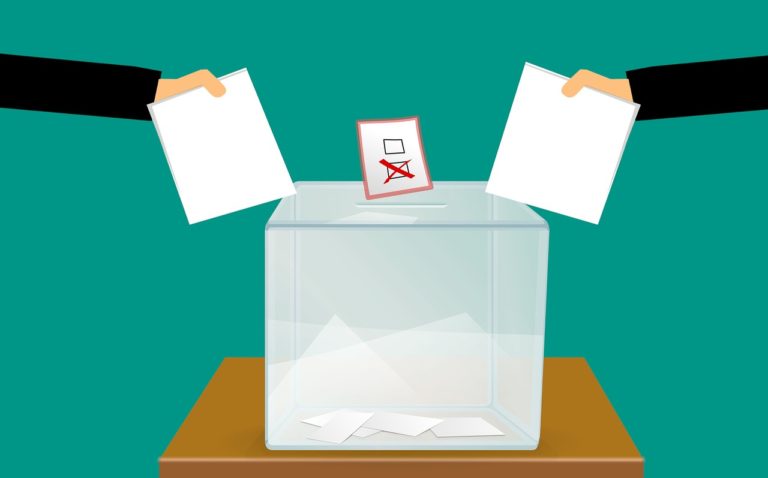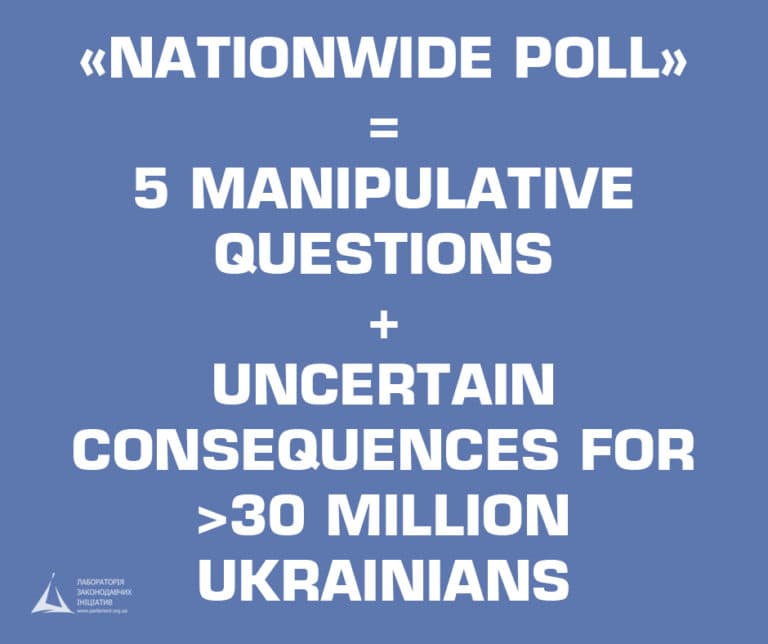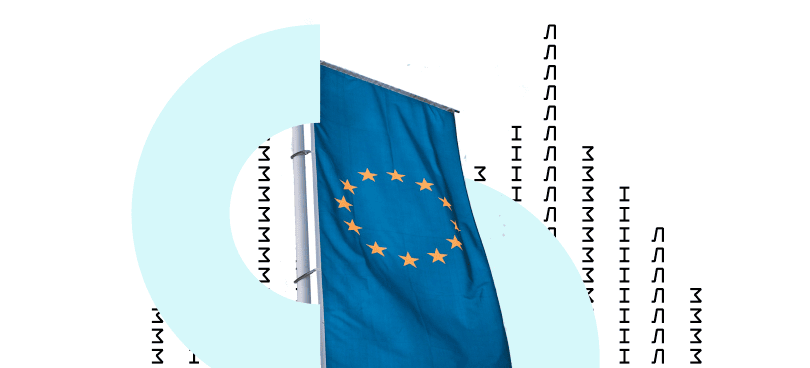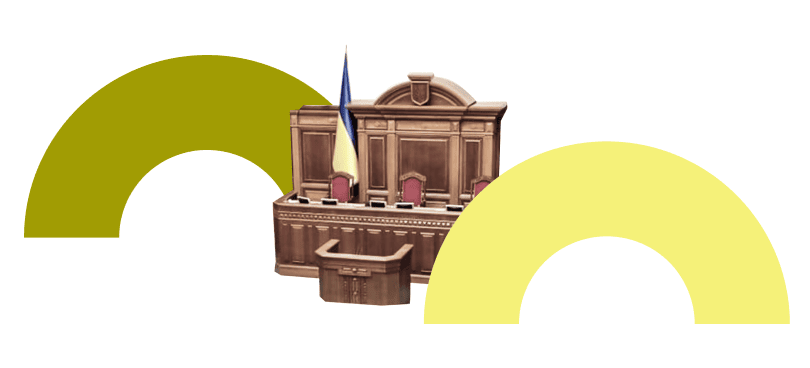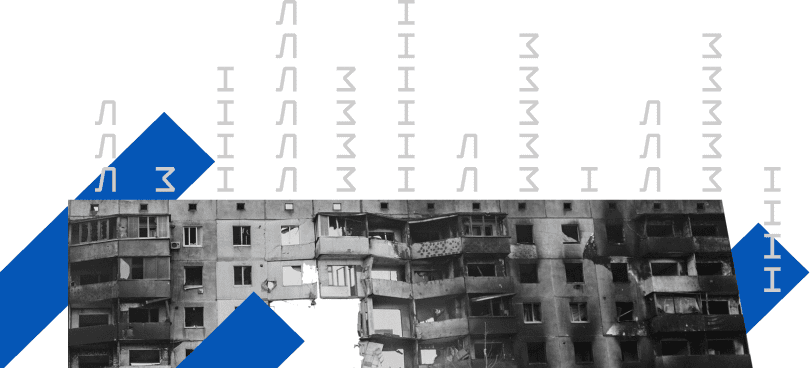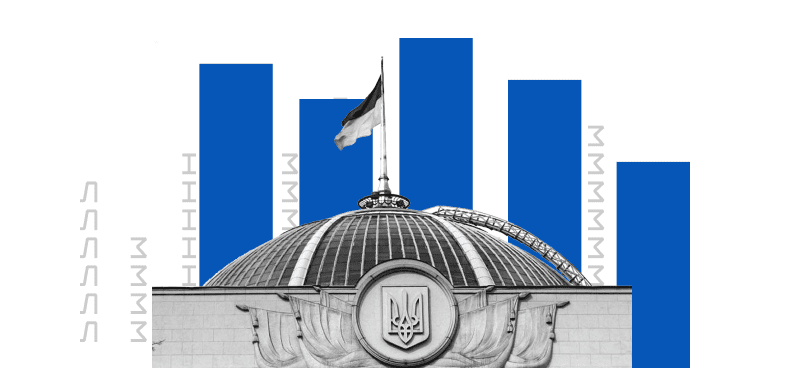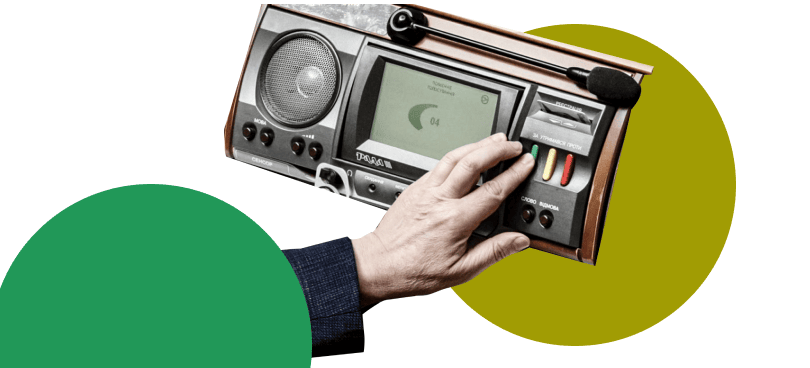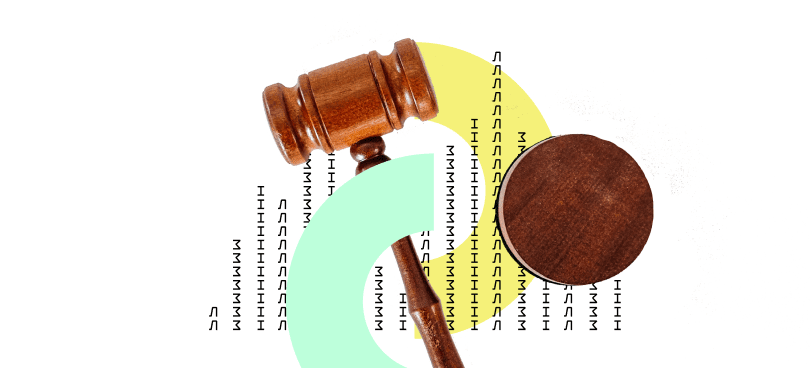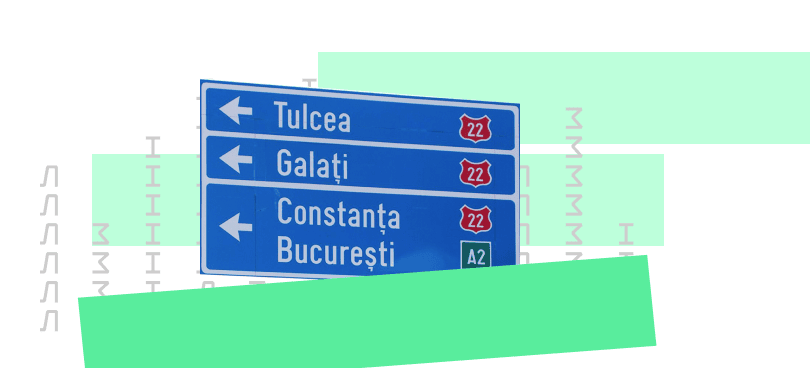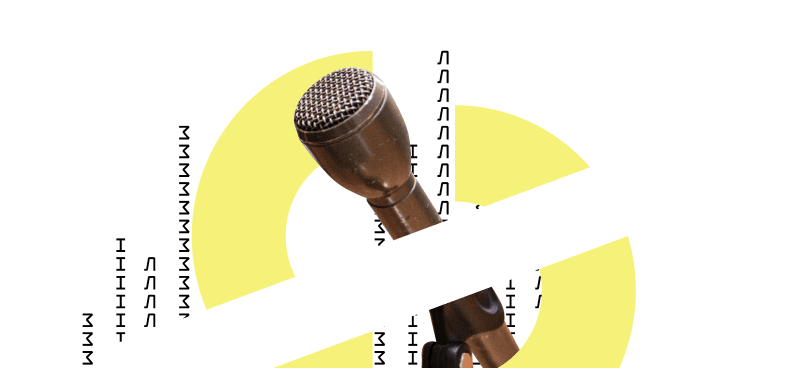On October 25, 2020, local elections will be held in Ukraine. Many experts consider this election to be one of the most difficult in Ukraine’s history:
- a new electoral system.
- many multi-member constituencies.
- optional voting for candidates on the list.
- funding problems.
- Russian pressure to cancel the election.
- a coronavirus pandemic with weekly record updates.
In addition, it is proposed to conduct a nationwide poll on election day.
Despite one of the basic principles of public policy – predictability, the details of this survey were unknown from the beginning. The questions that citizens are asked to answer were voiced by the President in video appeals, and still (a week before the election and the announced poll) have no formalization.
Although there were statements that the poll would be private (i.e., funded by an “unknown oligarch”), it was announced by the President of Ukraine. Moreover, in September, one of the leaders of the parliamentary majority – Oleksandr Korniienko – registered a bill on public opinion polls (Draft Law on Amendments to the Law of Ukraine “On the Central Election Commission” on Public Opinion Polls Number, registration date: 4043 dated 03.09.2020). The bill proposes to give the CEC the authority to conduct (according to the decision of the Cabinet of Ministers) public opinion polls on the day of voting in local elections. The bill was never passed before the local elections, and Volodymyr Zelensky announced a “nationwide poll” without any legal grounds.
What is wrong with this presidential initiative and a bill that could allow for constant public opinion polls during elections?
As the constitution of a democratic state, Ukraine’s Constitution establishes that “the bearer of sovereignty and the only source of power in Ukraine is the people“. The question arises as to the significance of the opinion of the bearer of sovereignty and the sole source of power. If the bearer of sovereignty and the sole source of power supports or does not support a certain issue, it is logical to conclude that the people’s representatives – public authorities – must act following the people’s will, namely – to support or not support a decision. Only the expression of the will of the people to support or not support a certain issue is called not a “public opinion poll” but a “referendum”. And the legitimacy of the results of such expression of the will of the people through a referendum is ensured by predictable, transparent, and understandable for all procedures.
Sociological agencies conduct public opinion polls. The public opinion poll results do not have the status of expressing the will of the people. They do not have to be fulfilled. Public opinion polls do not establish the opinion of every citizen of Ukraine: about 2-3 thousand respondents express the opinion. There is a methodology for conducting opinion polls, which determines and declares a certain level of error as to how correctly a sample of 2-3 thousand respondents conveys all Ukrainians’ opinion. No one has a monopoly on conducting surveys – if you want and have the resources, you can create your sociological agency and conduct surveys on any topic. The poll does not claim to establish the will of the people and has no legal consequences. Unlike a poll, a referendum (which obliges the authorities to respond to the results in one way or another) can only be organized and conducted by the state. It is funded transparently through special funds or budget funds. It aims to reflect the opinion of as many citizens as possible (as a rule, there should also be a certain required level of voter turnout). It involves not a few thousand but millions of citizens.
The “public opinion poll”, as proposed by the bill, will be conducted by the state monopoly. If it is planned to be held on election day, millions of citizens will be asked instead of 3,000. And all this is presented not as a referendum, but as a poll!
Besides, the President assured the citizens that the will of the people expressed during the poll will be fulfilled.
But we emphasize: first, there are no legal grounds for conducting the survey; secondly, the President, by the Constitution, has no authority to announce any “poll”.
At this point, it is worth pausing and congratulating all readers who have read this paragraph. After all, the number of words from the beginning of this article to this paragraph already exceeds the number of words in the draft law introduced by Oleksandr Korniienko.
The procedure for conducting a poll, which by all indications is a referendum, is almost not regulated at the legislative level. The level of turnout, the issue of mandatory participation in the “survey”, its legal consequences, the procedure for counting the results of the “survey”, protection against falsification of results, protection against manipulative issues, the procedure of campaigning, etc. The bill does not regulate all this.
The CEC should establish the procedure for conducting such a “poll” and its organization (according to the draft law). However, public opinion polls are not within the competence of the CEC. Logically, the CEC organizes the referendum, but the procedure for holding a referendum (according to the Constitution) is established exclusively by laws, not by CEC resolutions. The draft Law on Democracy through an all-Ukrainian referendum adopted in the first reading, although it has shortcomings, will still comprehensively regulate the issue of holding a referendum.
Both public opinion polls and referendums can be forms of consultation with citizens. However, the form of this consultation must be coherent. Public opinion polls should be representative: consider the distribution of citizens by gender, age, place of residence, etc. If proper distribution (representativeness) is not ensured, the results of such consultation will be skewed. The referendum must be held according to prescribed procedures; otherwise, its results will also be distorted.
Citizens of Ukraine are already familiar with the distorted referendums, which were not conducted according to the proper procedure (or rather the procedure did not exist at all, because as of 2014, the Law “On All-Ukrainian and Local Referendums” was no longer in force) and were not representative. “Referendums” in Crimea, Donetsk, Luhansk are good examples of neglect of procedures. And this is a danger to the democratic system. In addition to the pseudo-referendums mentioned above, there are many examples of usurpation of power through a referendum. In such cases, the referendum created an additional channel of legitimacy, allowing a strong figure, usually the president, to bypass parliament or other constitutional bodies and usurp power.
The draft law on public opinion polls proposes polls, which in essence and features are a referendum. Still, it brings the order of its organization into the sphere of bylaws – CEC resolutions. Polls that will claim the will of the people, to which Ukraine’s leaders will refer to making the most important decisions, will not be regulated by law. This opens up a huge space for distorting the will. The Electoral Code of Ukraine has 289 articles to protect the electoral process from distortions and manipulations. The draft Law “On Democracy through an All-Ukrainian Referendum” has 131 articles and occupies 157 pages to protect the referendum process from distortions and manipulations. The rhetorical question is why the draft law on public opinion polls is two pages long and has less than 400 words? Maybe not from, but for manipulation?
At least the questions announced by Volodymyr Zelensky seem manipulative.
Legislation in some countries explicitly prohibits the referendum on issues related to justice. However, we have the question №1:
“Do you support the idea of life imprisonment for corruption on a particularly large scale?“
This question is formulated as if non-support of this type of punishment means supporting corruption on a particularly large scale, leading to an affirmative answer.
This is even though the system of anti-corruption bodies is still not working properly. So far, the accusations supported by the court and, accordingly, the sentences for top corrupt officials have yet to be sought. If the existing system of anti-corruption bodies, which has been built for a long time, cannot ensure the implementation of the current legislation, it is difficult to imagine that increasing the level of punishment will somehow correct this situation.
The peculiarities of the free economic zone’s legal status, which is proposed to be created on Donbas’ territory in question №2, are unclear.
Citizens can only guess whether this economic zone will be “a cat in a bag” or “a wolf in sheep’s clothing”, because the phrase “free economic zone” does not have any specific meaning. There are dozens, if not hundreds, of free economic zones in the world. It is not clear which of them citizens are invited to choose.
The Verkhovna Rada has previously approved the bill on reducing the number of MPs to 300. It is unclear why the President wanted to consult with citizens right now by asking question №3, and not before initiating consideration of this bill.
Although there is a nuance: the Constitutional Court of Ukraine issued an opinion with reservations on this bill. This means that, following the Rules of Procedure, the Verkhovna Rada had to finalize the draft amendments to the Constitution and re-initiate its consideration in the CCU. However, the parliamentary majority did not do so, deciding to ignore the reservations of the CCU, which were purely technical and legal, aimed at preventing inconsistencies between the various articles of the Constitution. In this context, bringing this issue up for a “referendum” looks like an attempt by the President (and his majority in parliament) to legitimize his actions on the bill (again, contrary to the position of the CCU and the provisions of the Rules of Procedure of the Verkhovna Rada). Such a populist flirtation with the “people’s expression of will” on, in fact, not a very simple issue, which puts law and procedure on one scale and the will of citizens on another, is alarming in its resemblance to authoritarian regimes.
Questions №4 and №5 are double.
The fourth question can be asked as follows – “Do you support the legalization of cannabis for medical purposes?” and “Do you support pain relief in critically ill patients?” The manipulation is that by supporting pain reduction, we automatically endorse the legalization of cannabis.
The fifth question can also be divided into two: “Do you support Ukraine’s right to use the security guarantees set out in the Budapest Memorandum?” and “Do you support the restoration of Ukraine’s state sovereignty and territorial integrity?” And a person who does not support the memorandum, at the same time, does not support our territorial integrity. The memorandum’s legal force, which has not been ratified by the signatory countries and did not contain any levers of influence or mechanisms to force the signatory countries to adhere to the memorandum, also raises questions.
The level of manipulation of questions in the informal public poll raises significant concerns about the manipulation of public opinion in the case of the adoption of Bill 4043 of 03.09.2020 or in the case of attempts to conduct such a poll without any legal grounds.
In general, the motives for initiating such a poll can be twofold: 1) to somehow revive the ratings of the “Sluga narodu” party and mobilize the turnout of its electorate in local elections, and 2) to legitimize dangerous steps for Ukrainian sovereignty in Donetsk and Luhansk regions.

